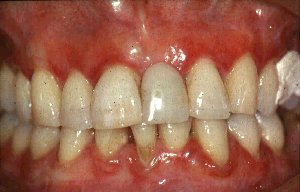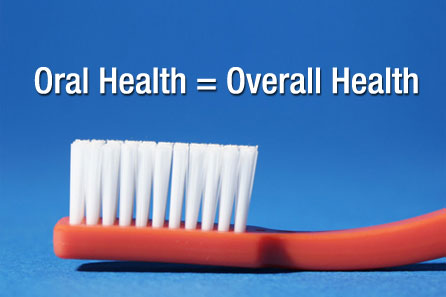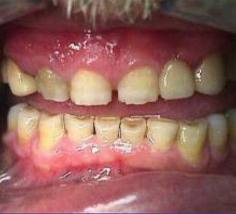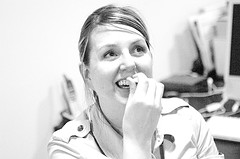The goal of Periodontal therapy is to halt the disease progression and prevent its recurrence, and restore the lost periodontal structure which occured as the result of the disease destruction. The later goal prompts us to evaluate the concept of “new attachment†or “regenerationâ€, and “reattachment†or “repairâ€. Each concepts will lead to different mode of periodontal therapy, and ultimately different result. New attachment is the ideal, desired goal, which each periodontist today are trying to achieve in every possible way. Continue reading
Tag Archives: Tooth
Habits that are harmful to teeth
1. Bruxism/clenching
Bruxism can be defined as the habitual grinding of teeth when a person is not swallowing or chewing, whether consciously or subconsciously. It usually occurs during sleep at night and is not detected by the person himself, but by the person sleeping next to the person. It is believed to be invoked by stress. Teeth clenching is more common during the day, and is associated with nervousness, stress, or a heightened state of emotion. These habits apply a heavy load onto the teeth over a long period of time causing the teeth to slowly wear down, decrease in height (attrition), and eventually exposing the dentine. Also, these habits have a heavy toll on the temporomandibular joint (TMJ), or the jaw joint, leading to temporomandibular disorders or pain.
How to Identify Risk Factors for Gingivitis
 What is gingivitis?
What is gingivitis?
Gingivitis or generally known as gums (gingiva) disease is defined as an inflammation of the gums surrounding the teeth. Gingivitis is commonly initiated by dental plaque formation, termed as plaque-induced gingival disease. With continuous plaque irritation and severe inflammation to the gums, this condition will progress into periodontitis, a destructive form of periodontal disease.
However, non-plaque-induced gingival lesion is an oral manifestation of systemic conditions that produce lesions in the gums; which are in very rare occurrence. Continue reading
Common Questions asked about baby’s erupting teeth
 What is teeth eruption
What is teeth eruption
- Teeth eruption is the process during which teeth grow through the jaw bone and pierces the gum and the tooth enters into the mouth.
- Teeth eruption happens for both baby teeth eruption and permanent teeth eruption.
- Teeth eruption occurs all throughout our lives, this is because teeth in the mouth are always moving and never stagnant. However, the movements are of course very small. Continue reading
How do baby’s teeth grow?
 This diagram shows the first baby teeth growing in the mother’s uterus
This diagram shows the first baby teeth growing in the mother’s uterus
So, how do baby’s teeth grow ? The baby teeth actually starts growing during the 6th week in the mothers uterus. These baby teeth growth starts with the Bell shape tooth germ. This Bell shape structure seen is actually the enamel organ, which will eventually grow into a baby teeth. As you can see the enamel organ or tooth germ contains numerous cells. These cells will continue to grow and differentiate into different and more advance cells to form the tooth. The outer and inner enamel organ eventually forms the outer casing of the tooth called the enamel layer. Where else the dental papilla cells will form the inner section of the tooth known as the pulp chamber. The permanent tooth bud will continue to grow into the permanent teeth after the baby tooth eruption is completed in the mouth.
Continue reading
Common Inflammatory Disease of the Jaw Bone
 Inflammatory Disease of the Bone
Inflammatory Disease of the Bone
Inflammation is a protective tissue response to injury or destruction of tissues, which serves to destroy, dilute, or wall off both the injurious agent and the injured tissues. The classical signs of acute inflammation are pain (dolor), heat (calor), redness (rubor), swelling (tumor), and loss of function (functio laesa). Continue reading
Oral Health in relation to Dental Decay and Gum Disease
 What is Oral Health ?
What is Oral Health ?
Oral health encompasses the health of our oral cavity. Our oral cavity (mouth) consist of our teeth and oral mucosa mucosa (gums). The health of our teeth is commonly compromised by bacteria which causes dental decay. Dental Decay is a dynamic process and it occurs due to a combination of a bad diet, insufficient oral hygiene care and bacteria in our mouth.
Continue reading
Teeth Whitening
TEETH WHITENING
Brighter teeth now are getting center stage in cosmetic dentistry. Most frequent reason patients seek for this dental care is discolored anterior teeth. Patients with normal teeth shades also do sometimes request for whitening treatments. Treatment options of discolored teeth include:
- Removal of surface stains
- Bleaching
- Microabrasions and/or macroabrasions
- Veneer
- Porcelain crown

